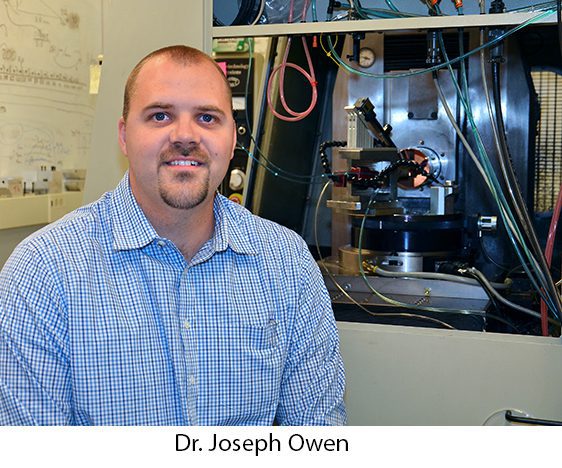From Student to Faculty Member, Freeform Optics is Constant for Dr. Joseph Owen

Through his undergraduate studies, senior design project, graduate thesis, summer internships, a job and now a position as a research faculty member, the one constant for Dr. Joseph Owen has been freeform optics. He has learned about them, made them, applied them, measured them and is now researching how to advance them to the next level.
Dr. Owen graduated with dual bachelor’s degrees in Mechanical Engineering and Physics from UNC Charlotte in 2011. He was in the early-entry graduate program, so went straight into the doctoral program in Mechanical Engineering, which he completed in 2015.
“Optics is what I always wanted to do,” Dr. Owen said. “It makes sense to me. For me, the complex shape stuff we do is fascinating.”
Freeform optics are optical surfaces that are not just flat discs or spheres, but also have curves, bends and angles. Such parts are difficult to manufacture, because they have no axis of symmetry.
Dr. Owen’s first exposure to freeform optics was working for Dr. Matt Davies during an undergraduate course taught by Dr. Davies. Following the end of that semester, Dr. Owen was invited to work as an undergraduate research assistant in the Freeform Optics Research Group (FORG) led by Dr. Davies. He then got the opportunity to do a project through a Summer Research Experience for Undergraduates program for Dr. Davies. That research led to his senior design project in 2010-11, which involved making improvements in the manufacturing of optics.
“The project was about making optical shapes,” Dr. Owen said. “It involved setting up the machine to make optical parts more efficiently. I primarily worked with a Moore Nanotechnology Systems diamond turning machine.”
In his second semester of graduate studies, Dr. Owen took a class taught by Hudson Welch who co-founded Digital Optics, a UNC Charlotte spin-off company. That class led to a summer internship at Digital Optics, where he worked on developing Alvarez freeform optical lenses for use in cell phone cameras.
At end of the internship, Digital Optics asked Dr. Owen to stay and work for them in the manufacturing of optics using diamond turning machines. The company agreed he could continue his Ph.D. studies while he worked for them, and do his thesis project based on research he was doing for the company. So in 2012, Dr. Owen started working at Digital Optics fulltime, while also taking nine credit hours of courses at UNC Charlotte.
This arrangement continued until December 2013, when Dr. Owen left Digital Optics as part of a reduction in force following the acquisition of Digital Optics by FLIR. He had passed his qualifying exams by then, and came back to UNC Charlotte as a research assistant.
“My experience with Digital Optics was very important to the freeform optics work here,” Dr. Owen said. “The software for controlling the machines was difficult to use. It had a lot of errors in how it told the tool to move. So, we began writing our own software.”
He completed his Ph.D. in 2015 and was hired as an assistant research professor in the Lee College of Engineering. His research work as part of the freeform optics team now continues to progress the advancement of optical manufacturing. The research involves the next level of diamond turning, milling and grinding complexity to make truly freeform optical shapes.
“Very little is standardized in our field at this point,” Dr. Owen said. “Everything is constantly changing. There are a lot of optical software programs and algorithms that do different things. We are developing new ways to make optics, and new ways to make multiple optics in one machine setup.
“The most fulfilling part for me is taking what has been designed on the computer and then actually making it. It’s great to get to hold the part in your hands. Then see it put into use and find out it really works.”